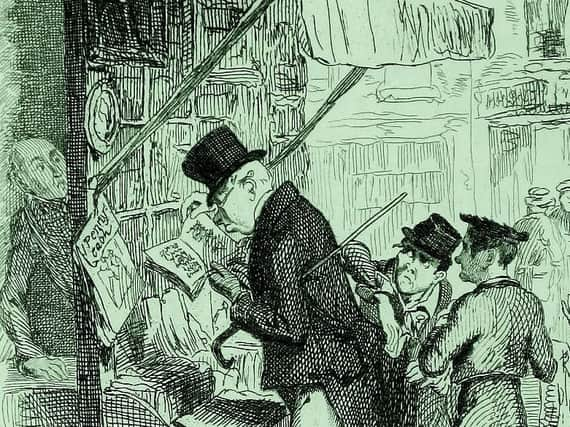No regrets for Preston teen who chose pickpocketing over prostitution


On the third Monday of January 1850 four persons, namely Thomas O’Gar, John O’Neil, Ellen O’Neil and John Green, were brought up at the Preston police court charged with picking the pocket of Miss Ann Boys, of Catterall, on the previous Saturday whilst she visited a draper’s shop on Cheapside.
Her purse containing a sovereign and several shillings along with a watch key had been taken from her dress pocket whilst in the store of Messrs Wilson & Lawson.
Advertisement
Hide AdAdvertisement
Hide AdShe had been on the premises about 15 minutes and when she came to pay for her purchases she realised her purse was missing.
Witnesses, including Inspector Rigby, testified as to Ellen O’Neil along with Green and O’Gar being in the shop and standing close to Miss Boys and to John O’Neil loitering outside the premises.
After leaving the shop, the prisoners made their way to Cannon Street where PC Hindle and other constables arrested them on suspicion of theft. At the police station all the suspects were searched and when O’Gar removed his hat, the purse, the watch key, a sovereign and other silver coins were discovered, the rest of the accused having pound notes and silver coins in their pockets.
Initially, Ellen O’Neil and John Green gave false identities, but it was eventually discovered that Green was the brother of Ellen O’Neil and that she was the wife of John O’Neil. Claiming they were innocent of the crime all four were remanded in custody to stand trial at the next Preston Sessions in mid February.
Advertisement
Hide AdAdvertisement
Hide AdBy the time the trial took place O’Gar, aged 18, had entered a guilty plea with the other three facing trial by jury. The evidence submitted suggested that all the accused had been working together on the streets that day indulging in light fingered theft. The jury took little time in delivering a guilty verdict.
The chairman Mr T B Addison before passing sentence remarked that all the prisoners were known to the police as notorious characters. He then revealed that John Green, aged 18, had been convicted 12 times, John O’Neil, aged 21, had since 1844 been imprisoned six times and that his wife Ellen O’Neil, aged 17, had four previous convictions.
All the prisoners were then sentenced to seven years’ transportation, at which point a crowd of female relatives of the prisoners who occupied the front seats of the public gallery commenced yelling and shrieking and making all manner of commotion. Tears and tantrums continued for a few minutes before calm was restored.
Whilst being held at Preston awaiting transportation, Ellen O’Neil was visited by a reporter from Manchester who, along with the prison chaplain, the Rev John Clay, interviewed her.
Advertisement
Hide AdAdvertisement
Hide AdThe outcome was a pamphlet entitled Extraordinary Confessions Of A Female Pickpocket that recorded her exploits.
Born in Stockport, she had aged 14 been influenced by an elder brother who took her to Knot Mill Fair where she watched him stealing purses.
Seeing it as easy pickings, she began to follow his example and events such as Blackburn fair where she pocketed £3 attracted her. She was soon travelling further afield with other girls and her brothers, being drawn to market days and fairgrounds. A good day in Hull earned her £7 and a festival in York shortly after she wed was fruitful with £12 thieved in a day.
Preston on a Saturday had become a profitable place to visit, with £17 taken on one day.
Advertisement
Hide AdAdvertisement
Hide AdUnimpressed by the prospect of a life in the mill, or on the streets as a prostitute as some of her friends, she had chosen thievery, which had on occasions put beer and beef steak on the menu. As the transport ship awaited, she had no regrets.